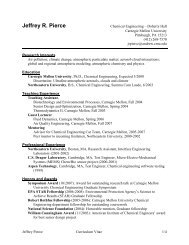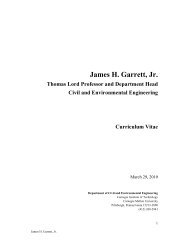1996 Electronics Industry Environmental Roadmap - Civil and ...
1996 Electronics Industry Environmental Roadmap - Civil and ...
1996 Electronics Industry Environmental Roadmap - Civil and ...
You also want an ePaper? Increase the reach of your titles
YUMPU automatically turns print PDFs into web optimized ePapers that Google loves.
Emerging Technologies<br />
112<br />
management, <strong>and</strong> other topics, could provide useful data that would establish industry<br />
expectation of best practices.<br />
The IPC roadmap devotes a specific section to benchmarking, noting that “…associationled<br />
efforts to develop benchmarking programs for the industry is needed…” [36]. The<br />
IPC report specifically focuses on financial, employee management, product, <strong>and</strong> quality<br />
benchmarks. Again, environmental benchmarks would be an important addition to the<br />
list.<br />
Workforce Training <strong>and</strong> Education: Education <strong>and</strong> training is recognized as a pervasive<br />
requirement throughout the various roadmaps. IPC notes the importance of training in<br />
CAD/CAM <strong>and</strong> design for manufacturing—a list to which design for environment could<br />
easily be added. The importance of teaching factory-integration principles, education <strong>and</strong><br />
specification <strong>and</strong> st<strong>and</strong>ards, training in new information technology tools (such as the<br />
Internet) <strong>and</strong> a focused effort to underst<strong>and</strong> the impact of manufacturing design on environmental<br />
safety <strong>and</strong> health are also cited by the IPC [36].<br />
While the SIA roadmap does not address education <strong>and</strong> training in as much detail, several<br />
places throughout the roadmap note the importance of improved training, particularly the<br />
factory integration discussion [31].<br />
The NEMI roadmap addresses the issue most directly, including it as one of the key infrastructure<br />
policy issues. There, the <strong>Roadmap</strong> notes the importance of electronic technology<br />
training throughout the educational system including specialized grant programs<br />
<strong>and</strong> special partnerships. NEMI also notes the importance of manufacturing training at<br />
post-secondary education <strong>and</strong> IPC recognizes the importance of enhanced efforts to raise<br />
attendance in trade <strong>and</strong> engineering schools [33, 36].<br />
It is vital that a well-integrated element of the engineering curriculum be a consideration<br />
of the environmental implications of engineering design, product development, <strong>and</strong><br />
manufacturing processes. Approaches for waste minimization <strong>and</strong> pollution prevention,<br />
recycling <strong>and</strong> recapture, <strong>and</strong> a variety of other design for environment <strong>and</strong> environmental<br />
management issues are critical to future educational programs.<br />
6.4 Gr<strong>and</strong> Challenges for <strong>Environmental</strong> Excellence<br />
The system improvements described above will contribute significantly to improved<br />
environmental management in the electronics industry. However, certain challenges are<br />
ambitious enough that they should be established as “Gr<strong>and</strong> Challenges“ for collaborative<br />
industry research <strong>and</strong> development—a set of enduring issues that can provide a fertile base for<br />
focused research <strong>and</strong> development. By doing so, evolution can be accelerated <strong>and</strong> revolution can<br />
be facilitated.<br />
The <strong>Electronics</strong> Manufacturing Technology <strong>Roadmap</strong>s published by NEMI call for the establishment<br />
of a clean electronics initiative, similar to the clean car initiative established to deal with<br />
emissions issues in the automobile industry. Such an action could make a significantly positive<br />
contribution by establishing a national focus on environmental processes in electronics<br />
manufacturing for government, industry, <strong>and</strong> academia. Once established, such an initiative






